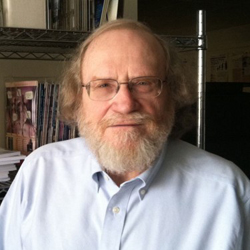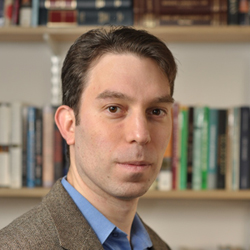Resident Research Fellows

Dr. Jade Berry-James, Dr. Jane Hoppin, Dr. David Berube, Dr. Andy Binder
The GES Center is very proud to announce the recipients of our 2014 -2015 Faculty Resident Fellows. Each faculty resident fellow receives a $20,000 stipend to do multidisciplinary creative and innovative research that has a broad impact on societal challenges and opportunities related to genetic engineering. All of the chosen research fellows submitted proposals that were ambitious but feasible with a worthwhile deliverable to interested stakeholders.
Dr. Rajade Berry-James
Cultural Attitudes Toward Genetically Modified (GM) Foods
 Abstract
Abstract
Previous research on attitudes toward genetically modified (GM) foods has shown that consumer skepticism continues despite scientific claims that GM foods are safe to eat. In faith-based communities, very little research has been conducted to explain cultural attitudes and opinions regarding GM foods. By soliciting focus group participants in Wake County (NC), this pilot project explores cultural attitudes as well as consumer preferences and religious acceptance of GM foods.
Read More
Introduction
Genetically modified (GM) foods are “derived from organisms whose genetic material (DNA) has been modified in a way that does not occur naturally” (World Health Organization, 2014). Most GM foods available in the marketplace include GMO crops of tomatoes, corn, soy and more recently, GM fish like AquAdvantage salmon. Consumer knowledge and public opinion on genetically modified foods continues to be debated (Evans & Ballen, 2013). While some consumers may have embraced genetic engineering as an acceptable approach to sustain hearty crops, agricultural food skepticism continues to exist in the United States and abroad (Banati and Szabos, 2006; Ludlow & Smyth, 2011). GM food skepticism fuels consumer acceptance of scientific research that dispels myths around safety concerns for genetically-engineered food (Ludlow & Smyth, 2011). Several research studies confirm that consumer awareness and attitudes influence consumer behavior toward GM food supply and lead to strong preferences for non-GM products (Baker and Burnham, 2001; Hallman et al, 2003; Li, et al 2004; Pew Research, 2006). In the research literature, however, the attitudes and perceptions of communities of color remain unclear. Cultural groups are exposed to information regarding GM food differently and consumer awareness and attitudes may influence the perceived risks and benefits of a GM food supply (Kahan, et al, 2008).
Objectives
The primary objectives of this pilot study are (i) to gain an understanding of cultural perceptions of consuming genetically modified foods and (ii) to explore cultural strategies that inform underrepresented groups of scientific advances in GM food production.
Study Design and Methods
Using the focus group method, this pilot project explores cultural perceptions around GM food acceptance. Religious leaders and members of their congregation are invited to participate in the pilot study. Six (6) focus group sessions are planned at churches in Wake County, NC during the summer of 2014. Focus group participants will be invited to share their attitudes and opinions about genetically modified foods. Each focus group session will consist of 8 to 10 people and will last about 2 hours. Religious leaders and members of their congregation will help to identify themes regarding cultural perceptions of health, risk, choice and trust.
Dr. David Berube
Synthetic Biology and the iGEM and DIYBIO Communities

Synthetic biology is controversial for many reasons not the least of which is governance. Building bacteria and viruses that have not evolved on the planet beckons issues of ownership, accidental release from incompetence, deliberate efforts, and industrial release as a waste or byproduct, and misuse by amateurs or terrorists. Whether we adopt stewardship grounded prudence and precaution, public engagement will be needed.
Read More
We know the public knows very little about synthetic biology (Hart 2008-2010) with a third believing benefits and risks will be equal and after an information exercise that percentage climbs to only 37%. As such, information alone does not seem sufficient. Generally the public support ongoing research over a ban by a 2-1 margin. A quarter of the US population worries about its use in biological weapons, in creating artificial life, and overall harmful negative human health effects. Although the public is willing to see it employed to develop a flu vaccine, less than one-fifth think it should be used to accelerate animal growth. We also know only about 10% of all articles about Synbio discuss safety and risks. Finally, the majority of article in the subject field are coming out of the USA. According to a Keck Institute report, we expect applications in environmental remediation, energy production, and biomedicine. Finally, we know the Venter Institute has created a synthetic bacterium knows as synthia.
This subject field has become associated with two fascinating phenomena:
- Since 2003, there have been international Genetically Engineered Machine (iGEM) competitions whereby students and entrepreneurs build genetically engineered machine using a registry of standard biological parts (aka BioBricks). The broader goals of iGEM include: (1) enabling the systematic engineering of biology; (2) promoting the open and transparent development of tools for engineering biology; and (3) helping to construct a society that can productively and safely apply biological technology. In 2003, there were four teams and in 2011 there were over 130 teams. iGEM was spun out from MIT as an independent non-profit in 2012. Because of its growing size it split into regions (Europe, the Americans and Asia) each having regional jamborees with finalists meeting at MIT for the World Championship in November. A new site may enable the regional approach to be mothballed in 2014. These competitions are well inventoried in online blogs. In 2013, DIYBio labs were able to compete in iGEMs for the first time.
- DIYBio (less than 6 years old), is an informal organization of over 2,000 citizen scientists with community labs all over the country and in Europe where biological research, some SynBio, takes place (for example, Kay Aull built a small lab in her bedroom closet in Cambridge, MA and used it to perform allele-specific genotyping for the human hemochromatosis protein (HFE) associated with the disease known as hemochromatosis, a disease that runs in her family). The US FBI has been engaged with domestic DIYBio groups and some of these groups have embraced their participation with the goal to observe safety protocols. It seems some of the DIYBio community has grown suspicious of media and social science researchers after the H5N1 controversy (NSABB recommended against publishing research on a novel contagious strain by Ron Foucher in Science and Yoshihiro Kawaoka in Nature) though this issue had nothing to do with an extant DIYBio community lab. Misframing led to miscommunication and high levels of suspicion.
Dr. Berube is working on determining the roles the DIYBio community will play in regulatory schemes and researching how the iGEM competition serve as a platform for patent generation and corporate acquisitions. In addition, he is ferreting out the inter-relationships between the BioBricks Foundation and the commercialization of synthetic biology. He is continuing his scholarship in the societal implications of nanotechnology, synthetic biology, and geo-engineering as well.
Find out more about Dr. David Berube.
Dr. Andrew Binder
Public Opinion of Genetic Engineering: A Meta-Synthesis, Emperical Meta-Analysis, and Extension
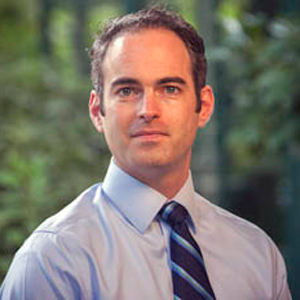
Despite much recent attention paid to public perceptions of emerging technologies in the social sciences, insights from individual studies are often limited in terms of scope, theory, and methodology. As one consequence of these limitations, the research community lacks an up-to-date, interdisciplinary synthesis of published research on public opinion of genetic engineering technologies. There are two main reasons why I have chosen to undertake an updated overview of this research. First, published work in this area has increased dramatically in the past decade. A preliminary Web of Science search reveals that, of the 102 articles specifically addressing “genetic technology” and “public opinion”, a majority of these (79) were published since 2004. An updated synthesis of research on this topic is sorely needed. Second, an overview of public opinion of genetic technology will provide a roadmap for scholars associated with the GES program.
Read More
The project will proceed in two phases and focus on a number of tasks guided by inter-related research questions. The first set of tasks addresses scope and nature of published research on public opinion of genetic engineering (GE) and related technologies. This phase will be guided by the following questions: In which scholarly journals have data on public opinion of genetic technologies been published? In what application contexts do these public opinion data address genetic engineering? What are the relationships between these attributes of published research studies?
The second phase builds on the first by meta-analyzing the empirical data found within the published research. For example, research studies may identify trust in government agencies as a key determinant of support for genetically engineered foods; the meta-analysis will examine the magnitude and direction of that relationship across studies. This phase therefore focuses on these general questions: What measured concepts are comparable and not comparable across studies? What relationships remain unsubstantiated by empirical data? When measures are comparable across studies, what relationships between variables are the strongest and most consistent? What broad-based and general conclusions does the published research allow us to draw about public opinion of GE?
I envision this overview as an essential tool for establishing long-term research agendas at the future Center for GES. These agendas have the potential to cut across disciplines, and a common understanding of citizens’ views will be useful to many researchers. I plan on seeking out the assistance of a number of faculty members and students associated with GES as the project gets underway in July 2014
Find out more information on Dr. Andrew Binder.
Dr. Jane Hoppin
Structured Literature Review of the Potential Human Health Effects from Producers to Consumers
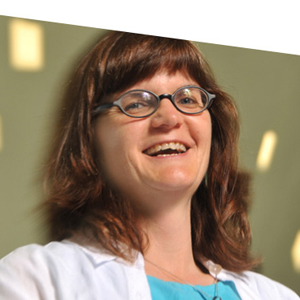
This project will be to conduct a formal review of the peer-reviewed literature regarding the potential human health effects of GMO foods. Prior to conducting the review, a formal analysis of potential exposure pathways for both producers and consumers will be evaluated. Related exposures will also be considered such as the potential reduction in diesel exposure or increased use of Roundup. Dr. Hoppin and her students will review the toxicological and epidemiological literature and prepare both a review manuscript for publication in peer-reviewed literature and a lay summary for distribution through the GES Center.
Read More
Background and Interests
Jane Hoppin is an environmental epidemiologist with extensive knowledge of agriculture and the human health effects of pesticides and other agricultural exposures. She is interested in expanding this expertise to understanding the potential human health effects of genetically modified foods. Environmental epidemiology involves stakeholders, public policy, and risk communication as we study the human health effects of chemicals in the environment.
Dr. Hoppin’s undergraduate degree is in toxicology. She started out in toxicology with concern that all chemicals were bad; she has moved from this dogmatic stance to a more pragmatic position that recognizes that there are many chemicals in our environment and it is in the public’s best interest to have good data on the exposure and health effects of these chemicals to allow individuals and regulators to make appropriate decisions about which chemicals to use. After graduating, she worked for 5 years doing environmental consulting in support of EPA Superfund work, initially putting sites on the National Priority List, then conducting risk assessments for those sites. After all this, she was interested in getting better human data on exposure, as she was very frustrated at the common risk assessment assumptions regarding people crawling over fences and eating dirt for a certain number of years, etc.
To start on this path, she went to the Harvard School of Public Health. In her first year, she worked for the Harvard Center for Risk Analysis preparing a document comparing the ways risk assessment is done in the federal government. Working with John Graham gave her experience in the larger public policy realm. To get to her real interests, better characterization of human exposure and health effects, she conducted research measuring exposure to lead among teenagers using bone lead as a marker of long term body burden.
Since graduating from Harvard, she has continued to study the human health effects of chemicals in the environment with particular interest in pesticides. At NIEHS, she was co-PI of the Agricultural Health Study (AHS), a study of 60,000 farmers and their spouses in North Carolina and Iowa. Not only did she gain experience in the conduct and analysis of epidemiologic studies, she also gained extensive experience interacting with stakeholders (e.g. farmers, chemical companies, agricultural extension, pesticide regulators). Her challenge was in how to communicate their results that reflected both the limitations of the science but helped people make good decisions for their health.
During her tenure with the AHS, GMO soybeans came on the market and immediately replaced the non-GMO crops within a period of two years. Since that time, she has been interesting in understanding the human health effects of GMO foods and building on her experience with other aspects of agriculture and post marketing surveillance of pesticides.
Find out more about Dr. Jane Hoppin.
Faculty Fellow
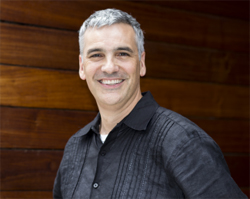
Dr. Matthew Morse Booker
The GES Center is happy to have Dr. Matthew Booker head the History of Genetic Engineering project. Dr. Booker is an Associate Professor in History at NC State. As a part of the project, he and his team will be interviewing people who had an impact on the science or policy of genetic engineering.
Collecting a History of Genetic Engineering and Society
Genetic engineering is at an important crossroads. The first generation of researchers and regulators are in many cases still actively working. But the clock is ticking to capture the memories and papers of these pioneering practitioners while they are still willing and able to share. At the same time a second and third generation of scientists, regulators, marketers, students, and advocates for and against the technology are now active and interested in that history. In the absence of archives, observers will create their own stories unhindered by fact. Gathering original words and memories is a matter of urgency.
Under the leadership of Dr. Matthew Booker, the GES Center at NC State intends to bring together the first generation of genetic engineering practitioners and to archive its story for posterity. The program founders know many of the founding generation. The faculty have institutional support from NC State University and the GES Faculty and staff in the GES Center are committed to this project.
Over the coming years we will bring major figures in the scientific, regulatory and advocacy communities shaping genetic engineering to NC State for public talks. In addition to key scientists, we intend to invite a wide diversity of people in the genetic engineering community, including basic scientists, biotech developers, regulators, policy makers, NGO workers, social scientists, and industry people, among others.
Find out more about Dr. Matthew Booker
Find out more about the GES Center’s History Project
Visiting Scholars
The GES Center was pleased to host Dr. Russell Powell, Assistant Professor in the Department of Philosophy at Boston University, during Fall 2014. The Center is currently hosting two additional scholars, Dr. Kaiming Guan from the Wuhan University of Science and Technology and Dr. Joseph Herkert, a professor of Ethics and Technology from Arizona State University.
 Dr. Kaiming Guan
Dr. Kaiming Guan
Back to top

 Abstract
Abstract



